Choosing A Van - A Deep Dive
In this post, we'll explore what options are available to you when choosing a van to live in. We'll also look into how to choose the right van for your needs, the pros and cons of self vs. professionally converted vans, and how to plan for the long-term future of your home on wheels.
Knowing what van to choose will help you decide how you choose to convert your van into a camper.
Table Of Contents:
What Are The Options?
Cargo Van
Dedicated Camper
Mini Van
Micro Camper
What Is The Best Van For Me?
Storage
Off-Road Capability
Bathroom
Parking
Standing Room
Living Inside vs. Living Outside
Is It Cheaper To Buy Or Convert Into A Campervan?
Professional vs. DIY Conversion
How To Choose A Van For Conversion
Should I Buy New Or Used
Is It Worth It To Buy A High Mileage Van
What Is The Average Lifespan Of A Van
My Biased Opinion
Conclusion
What Are The Options?
To start this post off, we'll take a look at the main options when choosing a van to live out of. We'll limit this to vans specifically since there is an abundance of other options available like cars, trucks, buses, etc. to get you on the road. To get a better understanding of what option might work for you, if you want to know what it's like to live in a van long term, here's a post about what a full month on the road is like!
Take a look at this post for a deeper comparison of the different types of vehicle dwellings.
The three main variants of vans that people choose to live in are cargo vans (big and small), dedicated campervans, and minivans.
Cargo Van
The main types of cargo vans are the Ram Promaster, Ford Transit, and the Mercedes Sprinter. Another newer, but discontinued, version is the Nissan NV. The sprinter used to be on a ram frame. So you might sometimes hear about the Ram Sprinter too.
These vans come in many different wheel lengths, weight capacities, and heights, with AWD, FWD, RWD, and 4X4 options. Due to the differences in features and brands, the prices vary wildly.
Take a look at this video that does a deep dive into each one of the big three (or 4) vans.
There are also plenty of other options where people convert low-roof vans like the Ford Econoline and Chevy Express. They are generally shorter in height but can be modified with popup toppers, fibreglass toppers, and metal toppers to provide standing room.
Like the most popular cargo vans, these come in many different configurations. Generally speaking, these smaller variants are much cheaper, more readily available, and can be converted for cheaper.
Alternatively, there exists smaller versions of the Promaster and Transit called the Promaster City, and Transit Connect. These are cheaper than their full-size counterparts, but provide much less space for living out of. Oftentimes, these micro vans provide the perfect amount of space for a solo van lifer.
Dedicated Camper
The next category is the dedicated camper van. These vans come pre-built with all you'd need to hit the road. There are many different brands and builders of these Class B RVs.
While there is usually a general layout to these vehicles, there are plenty of different modifications to select from. Most options are based on the standard frame of the big 3 vans.
Some of the most popular in this category are the Winnebago Revel (Sprinter), Thor Sequence or Winnebago Travato (Promaster), and Coachmen Beyond (Transit).
These vans can be quite expensive as they are generally considered to be in the luxury segment. Some of these vans come standard with awnings, swivel seats, and a shower, while others have a second row of seating for additional passengers, and forgo the shower for a larger pantry.
This video goes into more detail on the Class B variants.
There are many older camper builds that have everything you'd need to get on the road. However, these builds can be outdated and not up to how we live nowadays. It's possible to buy one of these, gut it, and convert it into a more modern build with all the outlets you'd want, modern water heaters, lighter materials, and even showers too!
These older vans can include campers like the Pleasure Way and Coachmen. While older, these vans can be well preserved with enough life left in them to fit your needs. These vans can range from the 1960s and onwards.
Alternatively, we can include vehicles like the Westfalia (VW Vanagon) in this category. These vans are mostly bare-bones regarding features, but they're the OG van life vehicle. While there is a segment of the market for classic vans, these are generally older and thus cheaper.
Mini Van
Now we have the 3rd most popular option for van conversion. Minivans are typically used by soccer moms worldwide and for people who need to bring along their whole family.
Minivans can also be used for minivan campers. The Dodge (Grand) Caravan, Honda Odyssey, Toyota Sienna, and even the older Chevy Astro are some of the most common vehicles used in this segment.
Converting these vans can be incredibly cheap too. Many people do minimalistic builds (sometimes no screws or modifications to the existing interior) to get on the road quickly and frugally.
These are great options as they provide a lot of amenities built in to make your conversion simple and functional. With outlets throughout, back stowable seats, window coverings, etc, these minivans make for a seamless transition into living in your vehicle.
Take a look at this video to see how someone converted their minivan into a mini camper.
Micro Camper

Another popular option abroad is the micro camper. While they haven't taken North America by storm yet, they are incredibly popular in Europe and some Asian countries.
Take a look at this post from Life On Wheels for a thorough look into the Micro Camper world!
What Is The Best Van For Me?
Now that you know what the options are, you need to take into account what you actually need. Sure, it might seem great to go for the most capable, and most expensive van, but you might never use all of its features. Some of these vans can cost as much as a home (a van is a home, just a bit different) with all the bells and whistles to make your life on the road seamless from your life at home.
Storage
One of the first things you should consider is how much gear and items you'll need to take along with you. Since van sizes vary wildly, the amount of storage space you need will largely dictate what van you should buy.
If you're a poly athlete who has multiple activities going on during any season of the year, then you might want a larger cargo van to accommodate your ski gear, climbing gear, backpacking gear, surfing gear, etc. The big three (Promaster, Sprinter, Transit) vans are great for this with plenty of interesting layouts for all the gear you'd need while travelling.
If you are living in a van to save money on rent, and you don't have any hobbies that are gear intensive, then you might only need a small family van/low-roof van.
Similarly, if you are not full-time living in your vehicle, and have the opportunity to store some of your seasonal gear, you might not require a full-size, high roof, cargo van.
Apart from specific gear like skis, surfboards, climbing gear, cooking gear, and bedding, it's possible to downsize most of your belonging to only one bag. You'll be limited on space regardless of what van you end up with.
Off-Road Capability

Where you want to go will determine the drive train of the van you buy.
There are plenty of people who get by without needing 4X4. With some skill and knowledge, you can get quite far without requiring all-wheel drive or 4X4.
Another point to consider is that you'll be putting a lot of stress on your build. Rattling and bouncing around will put stress on your cabinets and anything screwed down, and you'll break things while off-roading too. (Think about that candle that you forgot to put away, or the plate that didn't make it back into the cabinet)
If 4X4 is something that you absolutely need, then a Sprinter is your best option for full-size cargo vans.
Alternatively, there are plenty of options for low-roof cargo vans that come with 4X4 options or have been converted. One of the best drive train conversion options is the Quigley Conversion.
If the van you decide to purchase is the right price, you might be able to budget for this conversion, costing roughly 13,000 depending on the van you choose to convert.
While I've never been so stuck that I needed recovery, I've been in some situations where 4X4 would have allowed me to access better spots and would have allowed me to get out of places easier (without chains, or airing down tires). For my next van, I will go with 4X4 to allow myself to push even further into the coolest spots.
Another aspect of off-road capability is the ground clearance your van has. Imagine driving up to a spot, only to be turned around because there are some ruts in the road that you bottom out or high center on. While most vans have low clearance to begin with, some modifications can be done to help you get further like lift kits or even the Van Compass lift and suspension kit.
Finding vans with these conversions already done is a bit harder, but they are out there in the used market.
Bathroom
Having a bathroom in your van is something you need to take into consideration. It changes how you will end up living in your vehicle.
There are options for blackwater setups, composting toilets, cassette toilets, bags and buckets, urination bottles (even direct tubing to the outdoors) and the fashioned way, a trowel and the great outdoors.
If you can go to the basics and use a bucket, or rely on catholes, then it's entirely possible to forgo the space required for a composting or cassette toilet. Not to mention, if you're city-dwelling, you have access to public washrooms.
As for showers, I believe it's possible to forgo a dedicated shower in your van. There are so many other options and better uses of the space. Read my post about how to shower in a van for a more in-depth look.
Parking
You need to think about where you'll be parking. There are issues surrounding your stealth factor. Also, some vehicles simply don't fit or aren't allowed.
I wanted the ability to be as multi-functional as possible. I wanted to be able to park on streets, campgrounds, and off-grid locations.
Take a look at this review of iOverlander to find spots to park your van for the night. (Also, it might let you know if your rig will fit or not).
If all you plan on doing is camping in cities, and the odd BLM, then you might only need a minivan with low clearance. If you plan to spend a lot of time off-road, then higher clearance will make it that much more accessible.
Some places don't allow RV's of any type to park on their main streets or parking lots (Looking at you, Tofino), and other places might not allow RV's into certain campgrounds (Columbia Icefield campground), so you might be limited based on your choice of vehicle.
Standing Room
If you plan on living in your van, you might want a high-roof van to stand up in. If you're only using the cargo area of your van for sleeping, then you can likely get by with a low-roof version.
Having a low roof comes with many other benefits. The "low growth" places that exist will be that much more accessible, your space will be more manageable to heat, and it increases your stealth factor when you're driving a vehicle people don't suspect you might live in.
Having full standing room allows you to spend time inside your van when you want to cook, get dressed, work, or hang out. This feature really comes in handy on rainy days and when cooking outside isn't feasible.
Living Inside vs. Living Outside

Further on the topic of living in your van, is weighing whether you'll spend a lot of time in your van, or outside of your van. Understanding how you'll be spending your time will dictate what van is most appropriate for your situation.
Living in your van means you work, hang out, cook, read, and sleep all in your van. Vans that are great to live in are ones that you can stand up in and have enough space to move around. Any of the big three work well in these situations.
Living out of your van means you spend more time outdoors, only coming back to sleep. Any van will work in this situation, but the smaller variants are better for this use case. Minivans and low-roof vans work well in this category.
I spend a lot of time inside of my van. It acts as a workspace, kitchen, theatre, library, bedroom and so many more functions. However, I do enjoy switching things up and working in a coffee shop, cooking at a park, or enjoying coffee on the beach.
Is It Cheaper To Buy Or Convert Into A Campervan?
Whether it's cheaper to buy a converted van or convert one on your own is a big question when deciding the future of your van. More often than not, it's financially cheaper to do it on your own.
However, doing this uses a lot of your time and you're bound to run into issues along the way. It can be financially cheaper, but it might not be cheaper in terms of your time and energy.
Professional Vs. DIY Conversion
When choosing to consult professionals to build out your van, you're nearly guaranteed the highest quality. Choosing the right builder can get you on the road faster and more easily.
Going through a professional gives you some peace of mind that everything will work as intended. There is also likely some sort of peace of mind that if something breaks when it shouldn't, it might be covered by the builder.
Contrary to the DIY version, you'd be paying a steep premium for a luxury van like the Winnebago Revel. These pre-built vans are made with the highest quality in mind.
Similarly, there are custom van conversion shops that charge a hefty premium for their expertise. These types of conversions can cost upwards of 150,000.
Alternatively, a DIY conversion allows you to learn so much as you go. You'll know how it was built, so when you run into any issues, you have a better chance of fixing it instead of having to get help externally.
Self-converting a van is a fantastic experience and lets you control the whole process down to the penny. It also allows you to know how everything works. So, when your lights stop working, you know that it's likely from bouncing around down back roads and loosening a connection to your fuse panel. The DIY conversions can range from 5,000 to 20,000 to build out a comfortable living space.
How To Choose A Van For Conversion
With the above in mind, what van to choose to convert depends on your abilities. Of the three main types, they're all pretty similar. You have a shell that you need to insulate, frame, and close off, along with options for electrical, fans, windows, cabinets, kitchen, and a bed frame.
There are a plethora of video series and guides on how to convert a cargo van to include almost anything you could want in a home on wheels.
Minivans are easier since there is less space to worry about, but also the challenge of more odd angles and compartments to work with. These builds are normally quite simplistic when compared to bigger van buildouts.
If you want to do as little as possible and only want a place to sleep, then a minivan like a Grand Caravan is a great option since it provides you with the bare minimum.
If you intend to make your van as similar to home as possible, then large cargo vans such as the Promaster, Sprinter, and Transit are great options. They are usually quite easy to build out thanks to their mounting points, square-ish frame, and size.
These vans are going to provide you with a more luxurious van life experience. Dependent on your needs for your mobile home, these vans are sure to offer more space to do what you please.
Should I Buy New Or Used?
Buying new provides you with a lot of benefits like a warranty, unused parts, etc. It also means you end up with a vehicle that you know everything about. Buying a used van is more economical, but you can never be certain about the maintenance and upkeep of your vehicle.
Below we'll go through some pros and cons of buying a new van.
| Buying New Pros | Buying New Cons |
|---|---|
| Unused | Cost and markup |
| Warranty | Treating it too gently |
| Newest Tech | |
| Better Mileage | |
| Long Lifespan |
However, if you're pinching pennies, the most economical thing to do is to buy used ones. It's possible to buy a used build too, but then you need to question the quality of the build, along with the state of the vehicle itself.
Take a look at this chart to compare the pros and cons of buying a used van (conversions included.)
| Buying Used Pros | Buying Used Cons |
|---|---|
| Cheaper | Sometimes the cost is close to a new vehicle |
| Repairs could be recent | Questionable history |
| You don't mind scratches | Worse fuel economy |
| Conversion completed | Short lifespan |
| The potential of added work from the last owner (rust) |
Take a look at this video about purchasing a used van and what to look out for.
Is It Worth It To Buy A High-Mileage Van?
Choosing to buy a high-mileage van depends on your desire to deal with breakdowns, maintenance and repairs. It can be cheaper to buy a new van instead of a used one as you might need to spend just as much to get it road worthy.
High-mileage vans are great for those on extreme budgets. They are usually significantly cheaper than brand new, and they might even have a build inside of them already.
High-mileage vehicles come with issues. If the maintenance wasn't kept up with, you might be inheriting a vehicle that needs more cost in repairs than you paid for the vehicle in the first place.
Taking your vehicle to a trusted mechanic for a pre-purchase inspection should help with identifying any issues that the owner might not be disclosing, or might not be aware of. This also gives you a good opportunity to ensure your vehicle is as roadworthy as possible once you address all of the issues.
Another point on this is that if the vehicle is older, it might be coming up to some relatively major repairs to keep it driving into that 200,000 range.
What Is The Average Lifespan Of A Van?
Typically, the engines are what will limit the vehicle's life. A lot of other components are replaceable, within reason, but once the vehicle needs a new engine, that is often not worth the cost.
Nowadays, the typical lifespan of a vehicle is 200,000 miles (320,000 km). While many factors play into this like upkeep, the particular vehicle, and the environment it exists in, this is a good rule of thumb.
There are some outliers to this number. Vehicles like the Sprinter T1N are known to have well above the average, in the 600,000s, which means that this vehicle can sometimes last double the average. Again, this might take a lot of maintenance, but if you're looking for longevity, it's something to think about.
So, when looking into buying used vehicles, you can gauge how much life the vehicle has left based on the average expected lifespan of 200,000 miles.
My Biased Opinion

There are so many options to get yourself living on the road. It's a lot to take in and a big decision to make. Below, I'll share my opinions to add a bit of extra knowledge to help you make your decision.
After spending over a year calling a van my home, I'm thoroughly happy with my decision (I've also spent time in a car and a minivan, so I'm grateful for the space and functionality). I made my purchase when van prices were already inflated, but still got a deal compared to the broader market.
Going with the Promaster has proven to me that most mechanics can work on this vehicle in a pinch. I've also been impressed with the cargo dimensions since I can sleep width-wise in the van to save space on my already small variant (136 WB).
If I had to do things all over again, I would have gone with a 4X4 van. While the sprinter does offer this option, there is some used Quigley conversion on the market that also would have sufficed. Having 4X4 would have given me access to many more places than my front-wheel drive vehicle.
Conclusion
Now that you've taken a deep dive into what goes into choosing a van, you can start your own journey to getting on the road.
Leave a comment with your tips and tricks about how you chose your van!

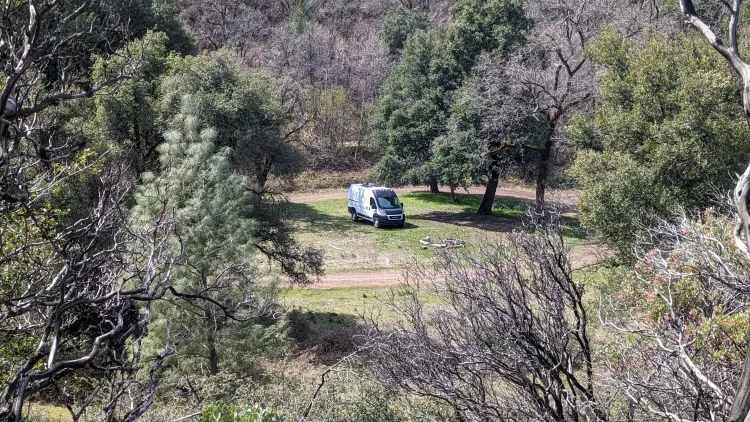
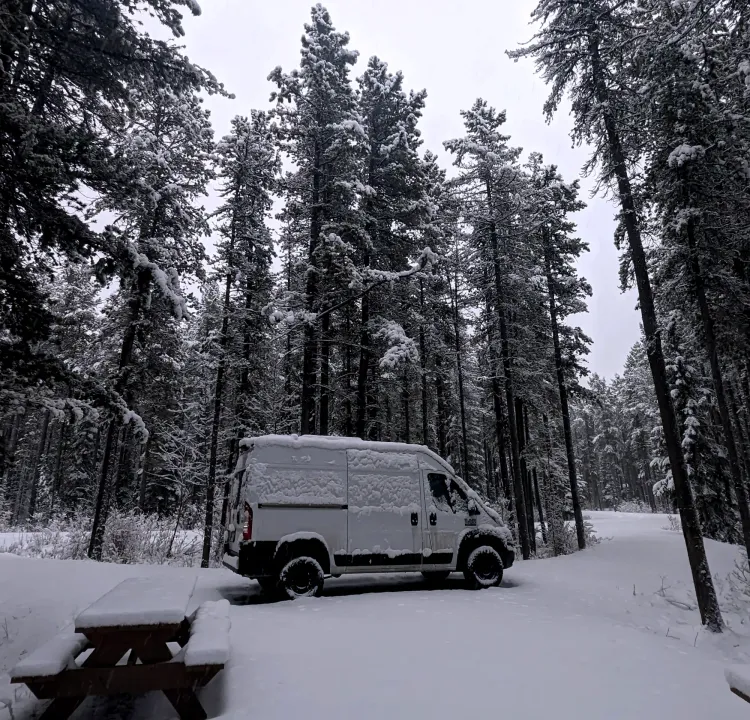
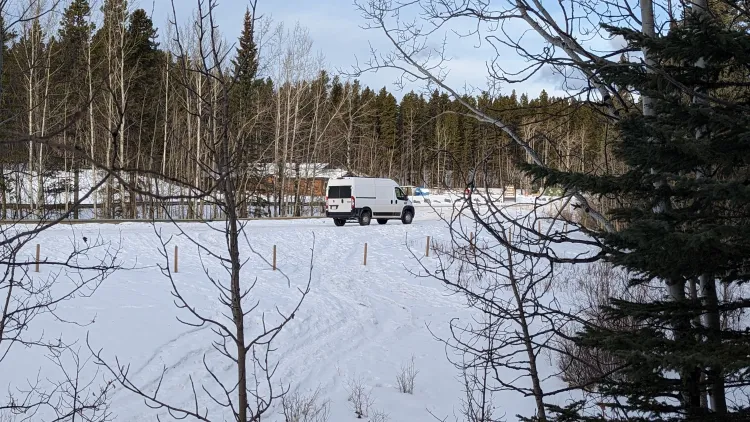
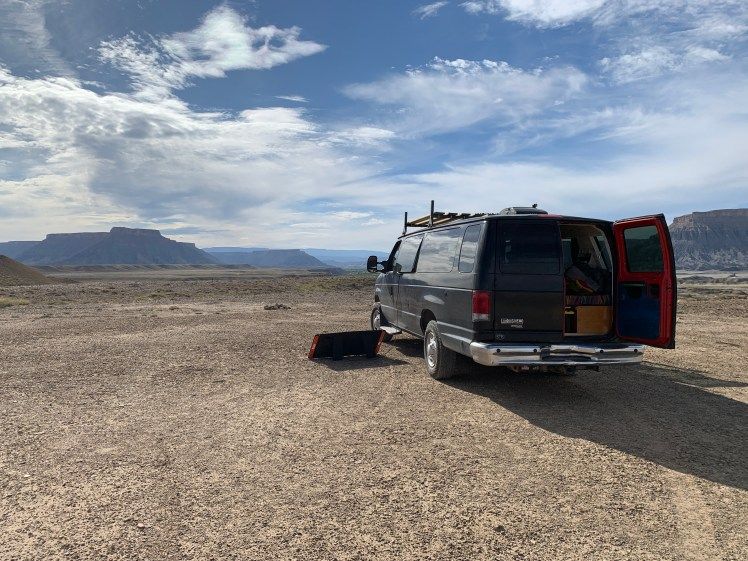
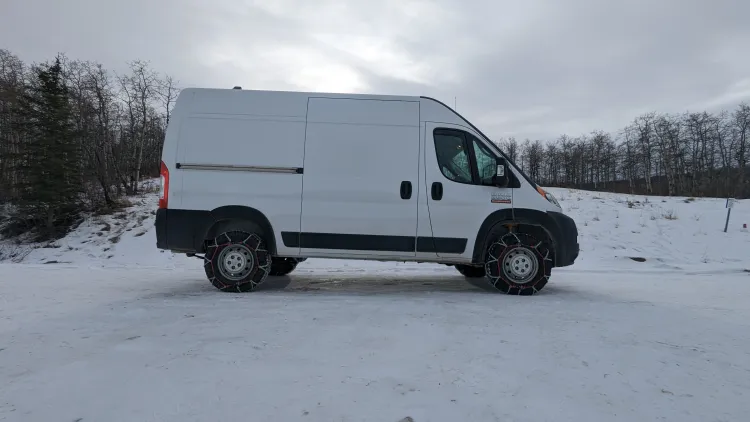
Member discussion